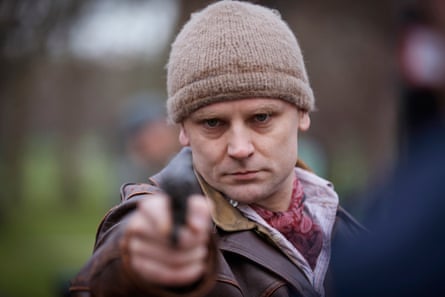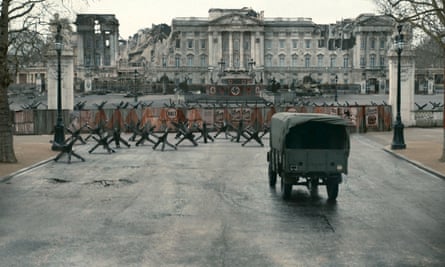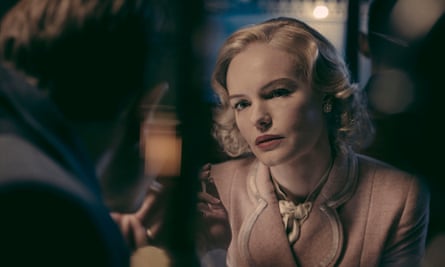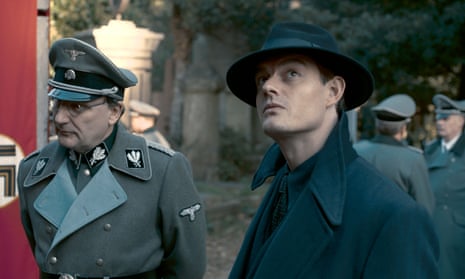Nazi counterfactuals are everywhere. After the success of Amazon’s The Man in the High Castle, the BBC are getting in on the act with a five-part dramatisation of Len Deighton’s 1978 novel SS-GB, which is premised on Germany winning the Battle of Britain, the UK government surrendering and the Nazis occupying the south of England. (They don’t seem to have been interested in the north, which we presume is run by a Vichy-style collaborationist administration.)
The first episode opens promisingly with a German air ace, who has just landed a Spitfire in the Mall to celebrate Russo-German Friendship Week – it is November 1941 and the Germans have been in occupation for 14 months – being gunned down by a plucky British resistance fighter. But this set-piece start, played out against a bomb-damaged Buckingham Palace, is far from representative of what follows. Because the great surprise of SS-GB, in this opener at least, is how intimate it is. This is primarily a drama about individuals trapped in a situation that makes impossible demands on them.

One individual in particular: Superintendent Douglas Archer, played by Sam Riley. Whether you like SS-GB or not will depend largely on your attitude to Archer, our central character, caught uneasily between the Resistance and his German masters at the Metropolitan Police. And I’m not sure about him yet.
For a start I couldn’t understand half of what he says, thanks to his peculiarly strangulated way of speaking. I’m assuming this – and the blank expression he adopts throughout – is supposed to reflect wartime exhaustion. His wife, we learn, has been killed in a bombing raid; he’s looking after his young son, also called Douggie, with the help of a warm-hearted young housekeeper; he’s having an affair with his secretary Sylvia; he smokes incessantly and drinks whisky while listening to blues records. Add the fact that he’s investigating murder cases and being asked to work for two competing German officers, the comedic Fritz Kellermann and the workaholic Oskar Huth, and you can see why the guy is too knackered to express any emotion or enunciate.

SS-GB is undoubtedly a rich mix – but could it be too rich? As well as the political drama of a UK taken over by the Nazis – cue swastikas on the Houses of Parliament and bystanders being beaten up in the street by stormtroopers – it is also a murder mystery and, if we read the runes correctly, is going to turn into something close to sci-fi with an attempt by the Resistance to spread a killer disease into the occupied areas. Something “worse than the Black Death”, according to Huth, who has arrived from Berlin to try to do something about it. That’s a very heady brew indeed. I’d have been satisfied with the Resistance assassinating air aces and blowing up the railway line from Basingstoke to Surbiton.
The epic dramas to come are only hinted at here. Archer and his avuncular Scottish sidekick Harry Woods go off to Shepherd Market, an area in central London with a dubious reputation, to investigate the murder of an antique dealer. A strange cloudiness in the eyes of the dead man, a railway ticket from London to Bringle Sands and some ashes in the grate are among the clues Archer and Woods rake over. All of a sudden it feels like an episode of an Agatha Christie mystery, or even Sherlock, and you start to forget about the Nazis. But remember those unworldly eyes – the dead man has been exposed to something horrible.

The all-knowing SS officer Huth – he even slips in the important information that Archer studied modern languages at Oxford, which explains his excellent German – is already on to this. We meet him soon after the discovery of the body, when Archer is summoned to an autopsy being performed by the king’s physician (what has happened to the king, by the way?). The celebrated doc says the murder victim was already dying of some hard-to-pin-down disease, and Huth and Archer agree the answer may well lie at Bringle Sands. A day trip to that sleepy resort on the south coast surely beckons.
Another mystery to be resolved concerns the outrageously beautiful and expensively dressed woman Archer spots close to the murder scene in Shepherd Market. Questioned in a smoky pub (Nazi London is nicely atmospheric and Brief Encounter-ish, shabbily brown and claustrophobic) she tells him her name is Barbara Barga and that she’s a recently arrived journalist with the New York Times. Leaving aside the unlikely glamour quotient – Barga, played by Kate Bosworth, looks like a princess in a landscape populated by put-upon peasants – this may well be true, but whose side is she on? Clearly she and Archer will end up in bed together, but what does she want and why was she hanging around a murdered man’s flat?

Knowing who you can trust is the key to living under the jackboot. It turns out that Sylvia, Archer’s secretary/lover, is in the Resistance – after burning her boats at Scotland Yard, she comes back to warn Archer a plot is being hatched against him by the Resistance because he is seen as a collaborator. Look out for a one-armed man in Hammersmith called John, she tells him, which should be a handy clue in an identity parade. What she doesn’t tell him is that John is the murdered man’s brother – indeed, he may well be the murderer too – and that he has got a job for himself at little Douggie’s school. Harry the police sergeant is also in the Resistance, and I even started to doubt the salt-of-the-earth housekeeper Mrs Sheenan, tearfully anxious about her husband, who is a prisoner of war.
Poor old Archer, in between going to bed with attractive women and listening to Big Bill Broonzy discs (freely available in war-wrecked, occupied Britain?), is trying to hold the line. “Boys, one day the Germans will be gone, and we will carry on and get back to the way we were and how things were,” he tells Douggie and Douggie’s schoolfriend Bob. “If we let things fall apart now because they are here, then it’s going to be difficult or impossible to get back then. The law is all we have and, quite frankly, I’m it.”
After this odd, sanctimonious statement, it crossed my mind that perhaps this honest broker guff is a front and that Archer is in the Resistance too. Every series these days needs a killer twist. But I guess for now we must take it at face value. He is doing his best to uphold what remains of the law in a country descending into barbarism. At some point, though, he is going to have to choose sides, if only for the sake of little Douggie, who is last seen in church angelically singing I Vow to Thee My Country while being watched by the sinister one-armed man.
What did you think? Will Archer join the Resistance (if he isn’t in it already)? Could you understand a word he was saying? Will you be taking your summer holidays in Bringle Sands? And, for those of you who’ve read the book, how does the show stack up? Let me know your thoughts below.






Comments (…)
Sign in or create your Guardian account to join the discussion